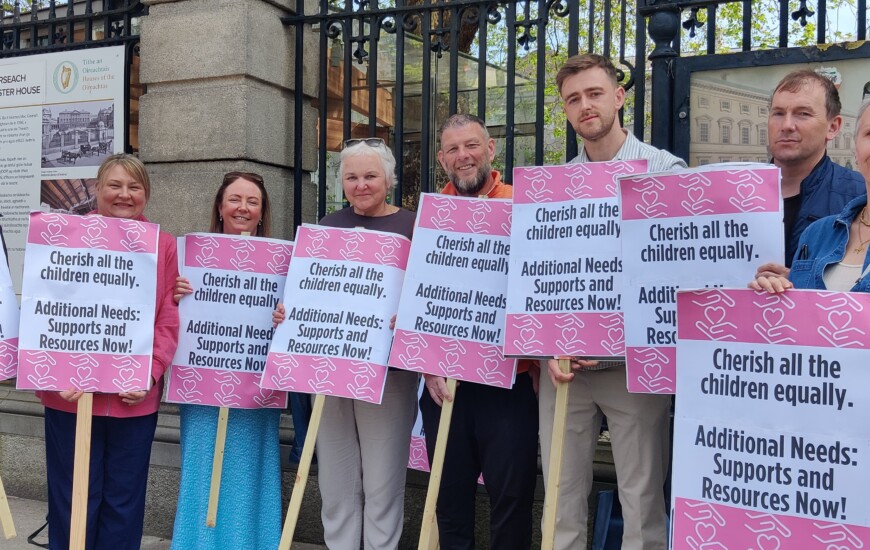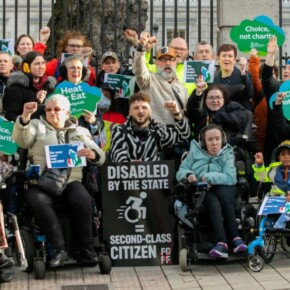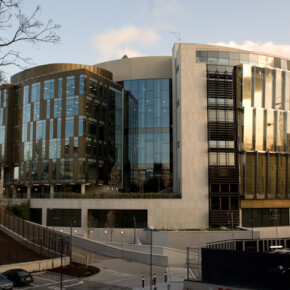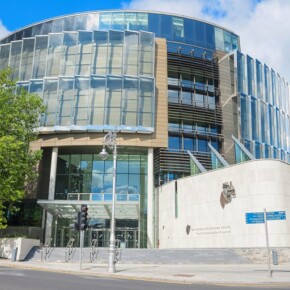Children with autism treated as “second-class citizens” says parent
Mike Finnerty 29 May 2024
Minister For Education Norma Foley will meet with a group of Finglas campaigners who are looking to secure a secondary school place for a 13-year-old non-verbal child with autism.
Greg Lewis, a special needs assistant and the father of Sam, staged a protest at the Department of Education on Thursday, May 23.
Lewis said he has had 15 rejections in the fight to secure a school place for Sam, with Sam due to start secondary school in September.
Sam has been a pupil in an autism class in a local mainstream school outside his catchment area of Finglas for several years.
The story gained national attention in March when RTÉ News covered the Lewis’ fight for a school place, and despite the case being brought up in the Dáil in early May, no progress was made on the issue until a protest took place at the Department of Education.
Lewis said, “our children are being treated as second-class citizens, they are being deprived of their constitutional right to education and we as parents are being pushed to breaking point.”
“If Sam doesn’t get a place in school this September, we are afraid he will regress and that his mental health will be badly affected. One of us will have to give up work to stay home with Sam if he doesn’t have a school place – what happens then? What do we tell the bank when we can’t cover our mortgage?”
People Before Profit TD Bríd Smith raised the issue in the Dáil, saying “I wish they (the parents) could stand here instead of sitting up there and speak directly to the Government and the Minister of State about this.”
“For the third time in his short life, they are having issues trying to find a school place for him. It is unacceptable in today’s world that his constitutional rights to an education are not being upheld. Sam not having a school in September puts a huge financial burden on the family. The mortgage has to be paid for, as do Sam’s speech and language therapy, swimming lessons, bike lessons and social club. They need answers and they need a place. They need assurance from the Government.”
Fine Gael TD Hildegarde Naughton said she was “very disappointed to hear of the lack of inclusion” in Sam’s school.
“We will have new policy advice that will address the care issue. It certainly will be addressed within my remit. We wrote to all post-primary schools asking them each to plan to provide for, on average, four special classes. This relates back to the pressure that is coming on post-primary schools because of the numbers of children moving into secondary education.”
Nicola O’Dea, parent of two children with autism and works as a special needs assistant said “in their short lives, our children face many hurdles.”
“I have no school place for my son this September, I can’t give up work. I know Greg and Celine have had to fight three times in Sam’s short life for school places and supports. How many times do we have to fight? How far do we all have to go to get access to a basic right for our children?”
People Before Profit election candidate for Ballymun-Finglas Conor Reddy established a Dublin North-West campaign group for inclusive education and has held a number of public meetings about the issue.
In April, a meeting attracted over 70 people with parents, SNAs and teachers sharing their frustrations in attempting to secure services for children with autism or other educational needs.
Reddy said “children, parents and our school communities are being failed by the Government. 100,000 people are waiting for Assessment of Needs, almost 10,000 wait for access to therapies and hundreds find themselves in limbo without school places for their children in September. Some parents and schools have taken the state to court, others have been protesting. It shouldn’t be like this – all children should be guaranteed their right to education and this right should be vindicated within their own communities.”
“Outside of housing, additional educational needs has been one of the most common issues I’ve been hearing about on doors during my local election campaign – there is clearly a very deep problem in the Dublin North West Area that needs to be addressed as a matter of urgency by Minister Foley, the National Council for Special Education (NCSE) and government more broadly.”
“Last week I was made aware that a local Primary School (Sacred Heart BNS) which had secured approval for two Special Classes has had to defer plans to admit pupils because the state has refused to fund the construction of classrooms to host the Special Classes. The Minister has made big announcements about additional places and supports but how much will be delivered? Sacred Heart BNS seems like it might be demonstrative of a general truth about the Government approach to the crisis in Special Education ”
In an early May edition of Northside People, we reported on children with additional educational needs in Dublin 15 dealing with government cuts to services.
In February, the Department of Education confirmed that children with complex needs no longer met the criteria for special educational training hours.
Despite Taoiseach Simon Harris’ claims that children with additional educational needs are a “priority” of his administration, the situation on the ground on the Northside tells a different story.
Helena Tranch, the principal of an Educate Together school in Dublin 15, said that the government’s self-imposed embargo on hiring more special needs assistants is a major hindrance.
“What these children need are the most basic needs; the ask isn’t that big,” she said.
Speaking to Northside People, Tranch said that a change in attitude was required at various government departments when it comes to the issue of recruitment.
“We have known since last October that this was going to be an issue for the 2024/25 academic year; it should not be taking until the end of May until we find out what the final outcome will be,” she said.
Social Democrats TD Gary Gannon said the cutting of SET hours was “dangerous and completely illogical.”
“Removing the number of pupils who require – and are legally entitled to – extra educational supports from the criteria for allocating extra educational supports makes absolutely no sense,” Gannon said in February.
Last year, Northside People ran a series of articles about students at the St. Michael’s School in Baldoyle being denied places in day centres following their graduation.
The issue, which was first raised in June last year, was not resolved until November.
It took a relentless months-long campaign of parents and local politicians to force Fianna Fáil minister Anne Rabbite to intervene and personally resolve the issue.
Local Labour TD Duncan Smith said, “we need to see some real changes that will have a tangible impact on the people who need them right now.”
“The reality is that the primary challenge facing special education in Ireland is the lack of adequate funding and resources. The underinvestment in special education has resulted in overcrowded classrooms, insufficient support staff, limited access to specialised services and interventions and, of course, children who are unable to get into schools.”
“As a result, many students with additional needs are unable to receive the individualised attention and support they require and it is their right to achieve their full potential,” he said.











